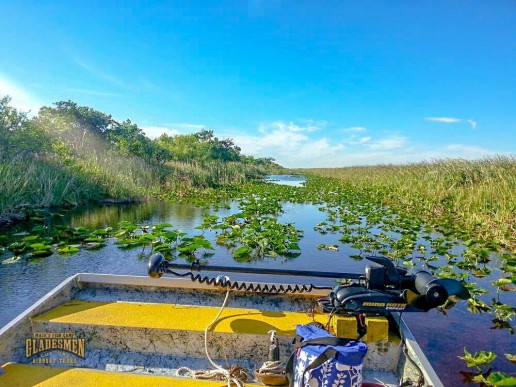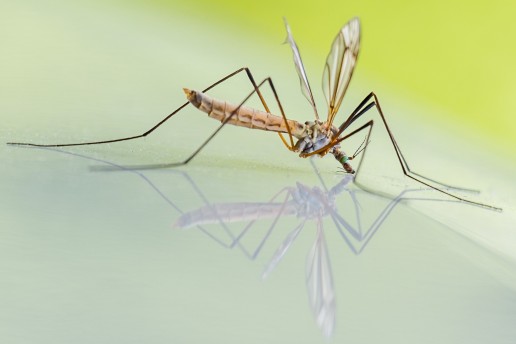Behold Florida's Beauty on an Everglades Eco tour
The Everglades is a mystery to people who may visit Florida, or have only just heard of it. It’s an ecosystem that is home to some of the most unique animal and plant life in the world. On an Everglades eco tour at Mack’s Fish Camp, you get to explore another world that’s hiding in plain sight.
Everglades Ecotourism
So, what is ecotourism? Ecotourism combines the adventure of exploring the beauty of nature with a raised awareness of it. Destinations like the Everglades, with its untouched ecosystem and high biodiversity, offer an experience that’s both fun and educational. Nature enthusiasts and adventurous families alike can expect a great time while learning its secrets. The Everglades has areas so remote that they can only be reached by an airboat, and have remained largely unchanged for centuries.
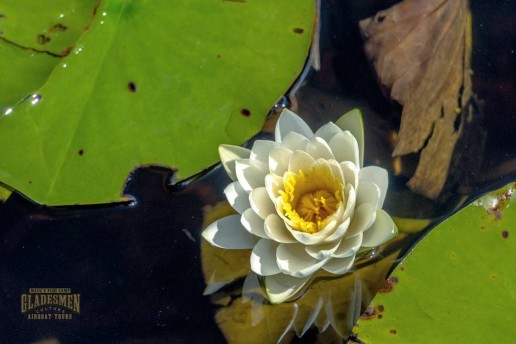
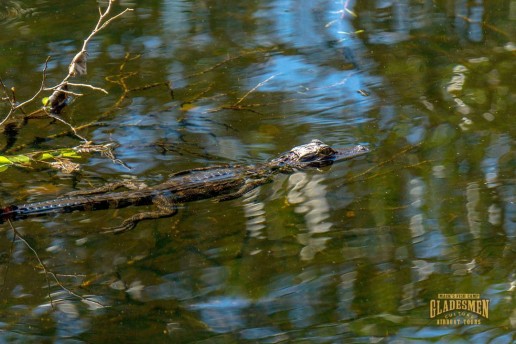
The Fragile Beauty of Florida’s Wetlands
As children we may learn that wetlands are the playground of ducks and frogs, not yet able to see their importance. Wetlands habitats are of vital importance to all life that thrives near it, and the Florida Everglades is no different. Many endangered animal species call it home, and it also provides drinking water to millions of South Florida residents.
Even though it’s an ecosystem fed by floods and shaped by fires year after year, the Everglades are remarkably fragile. In recent years, its protection and its restoration have grown as important issues to Floridians.
Unforgettable Adventure on an Everglades Eco Tour
Offering the chance to see and hear exotic bird species and observe the quiet power of wading alligators up close under an endless sky, the Florida Everglades is a feast for the senses. It is truly the defining natural attraction of Florida, as well as the legacy of the Gladesmen Culture here at Mack’s Fish Camp. If you’d like to take an Everglades eco tour with us or just want to experience an airboat ride in Miami, come on by.
Mosquitoes In The Everglades
Mosquitoes are easily the most disliked animal in the Florida Everglades. Their buzzing and biting makes them a nuisance to people, especially during the Everglades wet season. While taking an Everglades eco tour, you may be surprised to learn that even they play a part in maintaining their environment. But here is some information about these insects to help you understand them and prepare for them before your Everglades visit.
Some Information About Mosquitoes
Mosquitoes are easily are most abundant during the Everglades wet season from May through summer. But their numbers drop significantly during the drier winter months. The wet summer months see peak mosquito activity because both their larvae and eggs can only thrive in water.
Male mosquitoes only feed on flower nectar.
Females bite animals for protein to develop their eggs.
A nuisance only to humans, the mosquito is a vital link in the Everglades food web. By laying their eggs in the water, their larvae are a food source for fish, turtles, frogs, wading birds, and other insects.
Mosquito Safety In the Everglades
Given the abundance of mosquitoes in the Everglades, you should take precautions to avoid their bites as best you can. When you take an Everglades eco tour or any other private airboat tour at Mack’s Fish Camp, we do provide bug repellent. But here are some tips to avoid mosquito bites when you visit the Everglades.
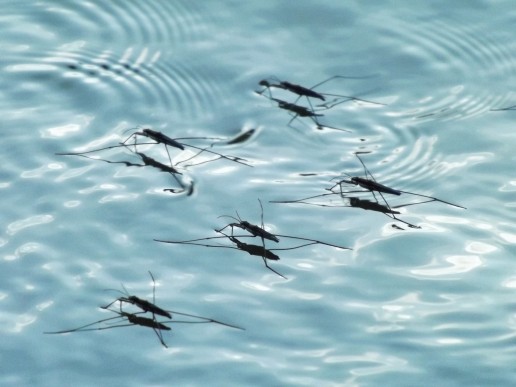
- Stay in the sun and avoid shaded areas. Those tiny vampires love shady spots.
- Don’t breathe… heavily. Mosquitoes are attached to carbon dioxide, and the harder you breathe out, the easier it is for them to find you.
- Wear light colored clothing. In addition to being a good fashion choice for the Florida sun, mosquitoes are less attracted to them. They are drawn to darker colored clothes like navy blue, black, or red.
- Avoid dense vegetation and bodies of standing water. Mosquitoes are concentrated in these areas (vegetation) or are their breeding grounds (water).
The Everglades is Zika-Free
While they are known carriers of disease, there have been no reported cases of mosquitoes in Everglades carrying the Zika virus. In fact, after collecting over 400,000 mosquitoes in the Everglades, a team of Yale scientists found no Aedes egyptii species, the known carriers of Zika.
Though considered a pest to people, mosquitoes are a valued part of the Everglades ecosystem. If they prove too overwhelming when you visit the Mack’s Fish Camp, then maybe you should explore it on an Everglades eco tour. A mosquito may be able to fly 40 miles for a snack, but it sure can’t keep up with an airboat!
Invasive Species in The Everglades
Thousands of native plants and animals reside in The Florida Everglades and help its habitats to thrive. But as massive as the Everglades is, all 1.5 million acres, it is vulnerable to invasive species that can harm the ecosystem here. Here is some information on some of this non-native Everglades wildlife, but you’re probably wondering…
What is an Invasive Species?
An invasive species is a plant, animal, bacteria, or other living thing that is non-native to the place it inhabits. They can grow and multiply quickly, and are harmful to their non-native habitat, the health of humans, even the economy of the places they invade. Invasive species can interrupt their adopted environments severely, and can even cause Everglades plants and wildlife to go extinct.
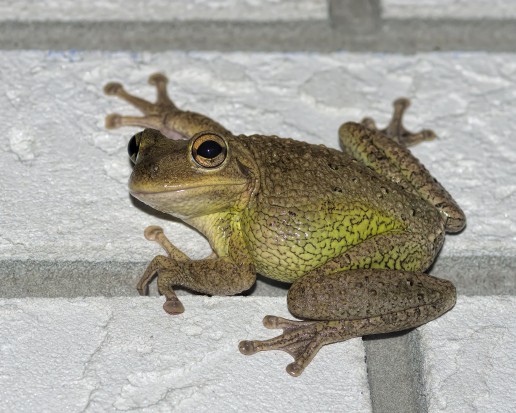
Invasive species have entered the Everglades by:
- Being released by local pet owners that don’t want to care for the anymore
- Being brought to Florida by or to sell on black markets
- Hitching a ride with travelers or foreign ships arriving in our ports
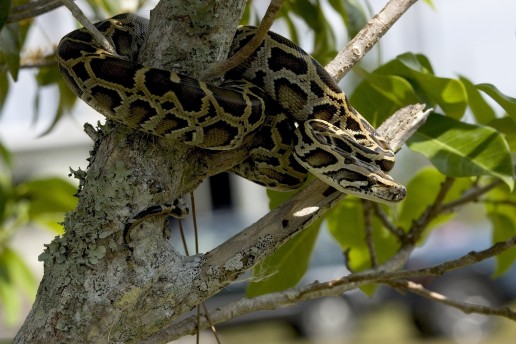
How Invasive Species Enter the Everglades
Invasive species can and have impacted the Everglades in several ways. The Burmese python has become well-known throughout America for feeding on native animals, including the American alligator, making them the dominant, or apex predator of the Everglades. Burmese pythons also pose a threat to people living near the Everglades, along with their pet dogs and cats. They often eat the young of native species, which shrinks the populations of their prey over time.
Invasive Everglades Plants
There are also invasive plant species impacting the Everglades as well. The Old world climbing fern affects several Everglades habitats from cypress swamps to pineland forests. Climbing ferns grow in dense concentrations which can smother native plants and rob them of sunlight. They can also act as a ladder to fires and draw them up to the canopy of the forest, burning areas that would normally be spared. This invasive plant can even change the water flow of streams with its dense roots, which can significantly affect Everglades ecology.
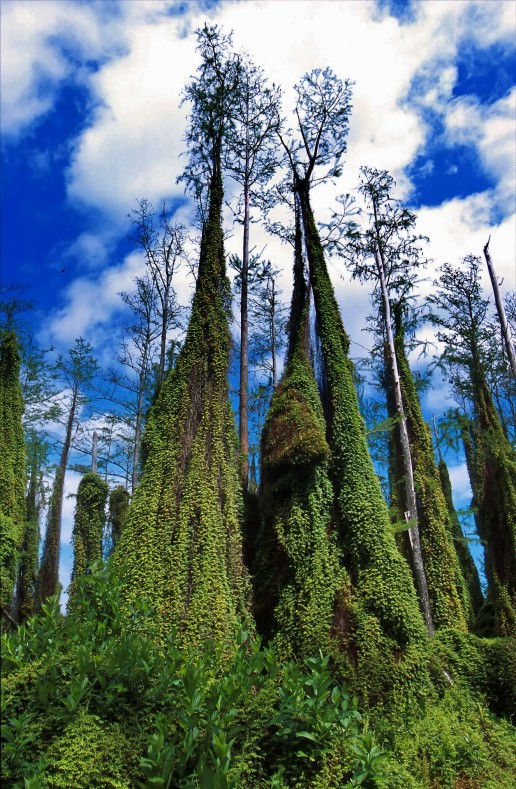
How you can help
- DO research before buying an exotic pet. Understand its needs, lifespan, how big it can grow, and if it is safe to own.
- DON’T release your pet into the wild if you no longer want it. This applies to fish and aquatic plants, too.
- REPORT invasive species sightings by calling 1-888-IVE-GOT-1 or online at www.IveGot1.org
At Mack’s Fish Camp we enjoy having the privilege to share the beauty of the Everglades ecosystem with the world. We see the preservation of this environment and the Gladesmen Culture as one in the same. We also educate our visitors about Everglades ecology, including invasive species on our Everglades airboat tours.

